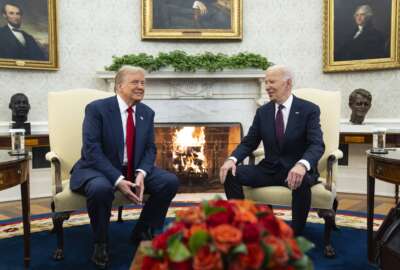GAO Report: Feds to exceed costs for cleaning up nuke waste
The cost of cleaning up radioactive waste at one of the federal government's premier nuclear laboratories has already exceeded expectations and more cost overru...
By SUSAN MONTOYA BRYAN
Associated Press
ALBUQUERQUE, N.M. (AP) — The cost of cleaning up radioactive waste at one of the federal government’s premier nuclear laboratories has already exceeded expectations and more cost overruns are expected, according to a report released Monday by a government watchdog.
The National Nuclear Security Administration spent about $931 million as of the end of the last fiscal year to remove contaminated rags, tools, equipment and soil from Los Alamos National Laboratory. That’s $202 million over 2006 expectations, according to the Government Accountability Office, the investigative arm of Congress.
The GAO said the nuclear agency is also on track to outspend the latest cost predictions set back in 2009 and needs to improve its estimates to better reflect current conditions, including the indefinite closure of the government’s only underground nuclear waste repository due to a radiation leak last year.
“Maintaining an updated cost estimate is critical so that officials making decisions about the future management of a project have accurate information for assessing their alternatives,” the report states.
U.S. Energy Department officials say they plan to complete a revised cost estimate by the end of September and construction of a new facility for handling so-called transuranic waste at Los Alamos is on track and on budget.
Congressional investigators said in the report that the DOE’s management of contracts and projects — including those carried out by the NNSA — has been on the radar for years as high risk for fraud, waste, abuse and mismanagement. The GAO pointed to long-standing difficulties in preparing reliable cost estimates for cleanup and construction projects.
NNSA and DOE’s Office of Environmental Management first estimated that removing Cold War-era waste radioactive waste from Los Alamos and building a facility at the lab for handling new waste would cost $729 million and be completed by 2012.
Scheduling problems led to another estimate in 2009: Between $848 million to $1.2 billion with a completion date of 2018.
Federal officials have yet to offer a new estimate, saying it might conflict with an agreement reached with the state of New Mexico for cleaning up the lab’s legacy waste.
But the GAO pointed to a draft estimate that puts the completion date at 2023 and the final price tag at about $1.6 billion.
According to NNSA and DOE officials, a new cost estimate for the project would have to rely on either unreasonably high funding assumptions to meet the 2015 deadline to close the current waste storage area or less money and political fallout from missing the deadline.
Federal officials stalled the waste removal project last year following the closure of the Waste Isolation Pilot Plant in southern New Mexico. A container of waste that had been packed at Los Alamos and shipped to the repository breached and brought operations to a halt.
According to the GAO report, NNSA removed about 79 percent of the transuranic waste at Los Alamos by last July but the remaining 21 percent includes buried waste, which officials say will be the most difficult and expensive to address.
NNSA and DOE officials told investigators the initial cost estimates were developed using aggressive funding assumptions based on the need to meet the state’s deadline. They acknowledged that funding shortfalls would throw the project off schedule.
The report says NNSA managers used additional funding in recent years to speed up the packaging and removal of waste, but without updating the cost projections, they were unable to say what effect that spending had on the total cost of the project.
Copyright 2015 The Associated Press. All rights reserved. This material may not be published, broadcast, rewritten or redistributed.
Copyright © 2024 The Associated Press. All rights reserved. This website is not intended for users located within the European Economic Area.






